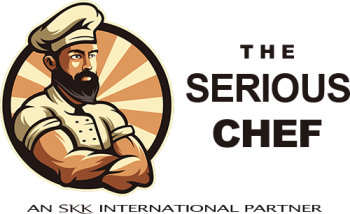Information about SKK products
What care should I take when using glass covers?
Just as with SKK's pots and pans, their glass covers also adhere to the highest standards. Nevertheless, glass is a fragile material that can be damaged by shock or excessive force. This can include: overtightening the screw which holds the knob in place (by using excessive force with tools or pliers). The lid can become energized and break. To properly tighten the knob, hold the screw (on the inside of the glass cover) in place with your thumb and tighten the knob with your other hand. No excessive force is necessary...at all. Also, please make sure the screw's washer remains installed; otherwise the knob will not be properly secured, and the glass could break.
How do I use my SKK pan?
For frying, add some oil to the skillet and heat briefly at the highest level. Then reduce the heat and place your food in the pan. This allows you to gently sauté the food while avoiding overheating the pan. For cooking, add water to the pot and bring to a boil as usual. Then add your food and cook it carefully.
Notes on the use of greases and oils
According to Stiftung Warentest 2/1988, an empty aluminum pan can reach a temperature of approx. 300 °C (572 °F) after only 3 minutes at the highest heating level. This can lead to a very fast burning of fats. During the combustion process, so-called tar resins are formed which can settle into the microscopic pores in the pan and burn. These tar resins cannot be removed (without further damaging the surface of the pan), and can lead to permanent impairment of the non-stick properties of the pan's surface. When cooking, greases and oils should not be heated so high that they start to smoke. Additionally, smoking oils release acrolein which is detrimental to your health.
The following table shows the smoke point (the temperature at which fats begin to burn) of different fats:
| Product | Smoke Point °F | Smoke Point °C |
|---|---|---|
| Refined Avocado Oil | 520 °F | 270 °C |
| Safflower Oil | 510 °F | 265 °C |
| Rice Bran Oil | 490°F | 254 °C |
| Refined or Light Olive Oil | 465 °F | 240 °C |
| Soybean Oil | 450 °F | 232 °C |
| Peanut Oil | 450 °F | 232 °C |
| Ghee or Clarified Butter | 450 °F | 232 °C |
| Corn Oil | 450 °F | 232 °C |
| Refined Coconut Oil | 450 °F | 232 °C |
| Safflower Oil | 440 °F | 227 °C |
| Refined Sesame Oil | 410 °F | 210 °C |
| Vegetable Oil | 400-450 °F | 204-232 °C |
| Beef Tallow | 400 °F | 204 °C |
| Canola Oil | 400 °F | 204 °C |
| Grapeseed Oil | 390 °F | 199 °C |
| Unrefined or Virgin Avocado Oil | 375 °F | 190 °C |
| Pork Fat or Lard | 370 °F | 188 °C |
| Chicken Fat or Schmaltz | 375 °F | 190 °C |
| Duck Fat | 375 °F | 190 °C |
| Vegetable Shortening | 360 °F | 182 °C |
| Unrefined Sesame Oil | 350 °F | 177 °C |
| Extra Virgin or Unrefined Coconut Oil | 350 °F | 177 °C |
| Extra Virgin Olive Oil | 325-375 °F | 163-190 °C |
| Butter | 302 °F | 150 °C |
Attention: Dietary fats and margarines and most native or cold-pressed oils (for example: native thistle or sunflower oil) are generally not suitable for frying. Always pay close attention to the manufacturer's instructions on the packaging. At The Serious Chef, we recommend cooking with Refined Avocado Oil or Refined Coconut Oil, because they have high Smoke Points and they're also considered healthy fats, part of a heart healthy diet/lifestyle.
Quick Links
We accept


 An item was added to cart!
An item was added to cart!

